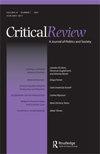Jeffrey Friedman: In Memoriam
IF 1.7
3区 社会学
Q4 POLITICAL SCIENCE
引用次数: 0
Abstract
For those who have been reading Critical Review over the years, the journal is synonymous with Jeffrey Friedman, who founded it in and edited it until his sudden death in December . Trained as an intellectual historian at the University of California, Berkeley, and then as a political theorist at Yale University, Friedman founded it when he was still a graduate student at Berkeley with the goal of putting various philosophical and political ideologies in conversation to scrutinize both their strongest and weakest arguments. It was, as one early ad in the New York Review of Books put it, the place where Marxists and libertarians could talk to one another. As Friedman’s interests evolved over the years, so did the journal, but he always treated Critical Review as a forum for critical intellectual debate. As he saw it, no single ideology captures the full complexity of the economic, social, and political spheres. Yet while casting a critical eye on all orthodoxies, he willingly published debates between scholars with radically different perspectives. As Friedman conceived it, the broad mission of the journal was to both model and promote an open society where participants would be selfconscious enough of their own fallibility that they would eagerly question their own premises, while also paying scrupulous attention to competing claims. This broad mission led Friedman to adopt, as its corollary, a subsidiary mission: to determine the best tools for analyzing the sources, nature, and effect of human fallibility in the face of the complexity of contemporary society. It was thus, from the beginning, interdisciplinary in orientation, as Friedman sought to canvass and evaluate the tools from such fields as economics, history, sociology, philosophy, and political science. Starting in the s, when Friedman entered graduate school in political science,杰弗里·弗里德曼:纪念
对于那些多年来一直在阅读《批判性评论》的人来说,该杂志是杰弗里·弗里德曼的代名词,他于 并对其进行了编辑,直到他于12月突然去世. 弗里德曼在加州大学伯克利分校接受过知识历史学家的培训,然后在耶鲁大学接受过政治理论家的培训。他在伯克利读研究生时创立了这家公司,目的是将各种哲学和政治意识形态放在谈话中,仔细审视他们最有力和最无力的论点。正如《纽约书评》早期的一则广告所说,这是马克思主义者和自由意志主义者可以相互交谈的地方。随着弗里德曼的兴趣多年来的发展,该杂志也在不断发展,但他始终将《批判性评论》视为批判性学术辩论的论坛。在他看来,没有任何一种意识形态能够充分体现经济、社会和政治领域的复杂性。然而,在对所有正统观念进行批判的同时,他心甘情愿地发表了观点截然不同的学者之间的辩论。正如弗里德曼所设想的那样,该杂志的广泛使命是塑造和促进一个开放的社会,在这个社会中,参与者对自己的易犯错误有足够的自我意识,他们会急切地质疑自己的前提,同时也会谨慎地关注相互竞争的主张。这一广泛的使命使弗里德曼采用了一个附属使命:在当代社会的复杂性面前,确定分析人类易犯错误的来源、性质和影响的最佳工具。因此,从一开始,弗里德曼就试图对经济学、历史学、社会学、哲学和政治学等领域的工具进行研究和评估,这是一个跨学科的方向。在中启动s、 当弗里德曼进入政治学研究生院时,
本文章由计算机程序翻译,如有差异,请以英文原文为准。
求助全文
约1分钟内获得全文
求助全文
来源期刊

Critical Review
POLITICAL SCIENCE-
CiteScore
1.30
自引率
12.50%
发文量
17
期刊介绍:
Critical Review: A Journal of Politics and Society is a political-science journal dedicated to advancing political theory with an epistemological bent. Recurrent questions discussed in our pages include: How can political actors know what they need to know to effect positive social change? What are the sources of political actors’ beliefs? Are these sources reliable? Critical Review is the only journal in which the ideational determinants of political behavior are investigated empirically as well as being assessed for their normative implications. Thus, while normative political theorists are the main contributors to Critical Review, we also publish scholarship on the realities of public opinion, the media, technocratic decision making, ideological reasoning, and other empirical phenomena.
 求助内容:
求助内容: 应助结果提醒方式:
应助结果提醒方式:


